
MUSIKTHEORIE
Scope & Guideline
Exploring the Depths of Music Theory
Introduction
Aims and Scopes
- Historical Musicology:
The journal explores music from various historical periods, analyzing its development, context, and impact on society. This involves both the study of well-known composers and lesser-known figures, as well as the examination of musical forms and practices. - Music Theory and Analysis:
MUSIKTHEORIE delves into theoretical frameworks and analytical methods that shape our understanding of musical works. This includes traditional approaches as well as contemporary theories, emphasizing the evolution of music theory over time. - Ludomusicology and Game Music:
A distinctive focus on the music of video games reflects the journal's engagement with modern media. This area explores how music interacts with gameplay, narrative, and player experience, bridging the gap between traditional musicology and contemporary cultural studies. - Gender and Music Studies:
The journal addresses issues of gender representation and identity in music, examining how these themes manifest in different genres and periods. This includes discussions of gender roles in music production, performance, and reception. - Digital Musicology and Technology:
MUSIKTHEORIE investigates the impact of digital technologies on music creation, dissemination, and analysis. This encompasses the study of digital music platforms, software, and the implications of technology on music theory and practice. - Cultural Contexts of Music:
The journal emphasizes the cultural significance of music, considering how social, political, and economic factors influence musical practices. This includes the study of music in various cultural settings, from sacred spaces to popular music scenes.
Trending and Emerging
- Ludomusicology and Video Game Music:
The exploration of music in video games is rapidly gaining traction, with multiple recent publications analyzing the role of music in game narratives and player experiences. This trend reflects the growing significance of gaming as a cultural phenomenon. - Interdisciplinary Approaches:
There is an increasing trend towards interdisciplinary research that combines musicology with fields such as cultural studies, gender studies, and technology. This reflects a broader understanding of music as a complex social and cultural artifact. - Digital Transformation in Music:
Papers examining the impact of digital technologies on music creation, distribution, and consumption are on the rise. This includes discussions on streaming, digital music production, and the implications for music theory and practice. - Music and Identity:
Recent publications have increasingly focused on the intersections of music with identity, including gender, race, and sexuality. This trend highlights the importance of understanding music as a means of self-expression and social commentary. - Sound Studies and Acoustics:
There is a growing interest in the study of sound as a phenomenon, including acoustics and soundscapes. This reflects a broader trend within the humanities to consider auditory experiences and their implications for understanding culture.
Declining or Waning
- Traditional Classical Repertoire Analysis:
There has been a noticeable decrease in papers focused solely on the analysis of traditional classical repertoire without broader contextualization. This shift suggests a movement towards integrating classical music with contemporary themes and interdisciplinary approaches. - Music Education Pedagogy:
Although music education remains a crucial area, the specific focus on traditional pedagogical methods has waned. Recent publications lean more towards innovative or digital approaches rather than conventional classroom practices. - Historical Performance Practice:
Research centered exclusively on historical performance practice has seen a decline. While this remains an important field, the journal seems to be favoring broader discussions that incorporate historical insights within contemporary frameworks. - Studies on Music in Nationalistic Contexts:
Papers specifically addressing music's role in nationalistic movements or contexts have become less frequent. This may indicate a shift towards examining music's role in global or transnational contexts instead.
Similar Journals
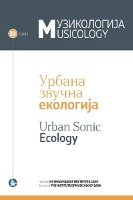
Muzikologija-Musicology
Transforming Music Research into Global DialogueMuzikologija-Musicology, published by the esteemed Serbian Academy of Sciences and Arts, Institute of Musicology (SASA), serves as a pivotal platform for scholarly discourse in the field of musicology. With its ISSN 1450-9814 and E-ISSN 2406-0976, this open-access journal has been committed to disseminating high-quality research since 2002, making significant contributions to the understanding and analysis of music in diverse cultural contexts. Located in Belgrade, Serbia, the journal proudly holds a Q2 ranking in the Music category for 2023, reflecting its high-impact contributions as evidenced by its Scopus rank of #136/180 and a percentile of 24th. Covering a wide array of topics within music, from ethnomusicology to music theory and history, it invites contributions that push the boundaries of music research. By fostering an open-access model, Muzikologija-Musicology aims to ensure that its findings are accessible to a global audience, thereby enriching the discourse and fostering collaboration in the musicology community.
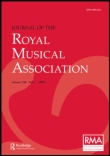
JOURNAL OF THE ROYAL MUSICAL ASSOCIATION
Bridging traditional and contemporary musicology.JOURNAL OF THE ROYAL MUSICAL ASSOCIATION, published by Cambridge University Press, stands as a significant repository for innovative research and scholarly discourse within the field of music studies. Recognized for its contributions to the understanding of musical practices, theory, and history, this esteemed journal offers a platform for academics and researchers to disseminate their findings to a broad audience. With an ISSN of 0269-0403 and E-ISSN of 1471-6933, the journal has maintained a notable presence since its inception, merging insights from both traditional and contemporary musicology. It currently occupies a Q4 ranking in Music within the Scopus database, reflecting its inclusion within the arts and humanities landscape. While the journal traditionally operates under subscription access, its continuing commitment to advancing music scholarship ensures that it remains an essential resource for students, scholars, and practitioners alike, fostering greater understanding and appreciation of musical artistry from 1987 to the current era.

Zeitschrift der Gesellschaft fur Musiktheorie
Empowering a global community of music scholars.Zeitschrift der Gesellschaft für Musiktheorie (ISSN: 1862-6750, E-ISSN: 1862-6742) is a premier open-access journal published by the Gesellschaft Musiktheorie, devoted to advancing the field of music theory. Since its inception in 2003, it has provided a crucial platform for the dissemination of innovative research, theoretical discourse, and critical discussions pertinent to music analysis, pedagogy, and aesthetics. Based in Berlin, Germany, this journal not only showcases the latest in musicological scholarship but also fosters a vibrant community of researchers, practitioners, and educators. With a commitment to accessibility, all published articles are freely available, enhancing the reach and impact of the work within the global music community. This journal is essential reading for anyone seeking to deepen their understanding of musical structures and practices, making it an invaluable resource for students, academics, and music professionals alike.
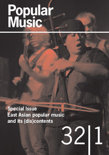
Popular Music
Illuminating the Intersection of Sound and SocietyPopular Music, published by Cambridge University Press, is a leading academic journal that has been at the forefront of contemporary music studies since its inception in 1981. With its comprehensive scope encompassing a rich diversity of topics within the fields of Cultural Studies and Music, this journal holds a respectable Q2 ranking in both categories as of 2023, underscoring its significant impact on the scholarly discourse surrounding popular music. Researchers, professionals, and students alike will find invaluable insights within its pages as it explores the socio-cultural dynamics of music from various global perspectives. While it is not an open-access journal, the publication aims to foster critical dialogue and interdisciplinary scholarship. Based in the United Kingdom, Popular Music serves as a vital resource for those interested in the intersections of music, culture, and society, sustaining a vibrant academic community through rigorous peer-reviewed articles and reviews. Engage with the latest research and deepen your understanding of popular music's ever-evolving landscape.

Muzikoloski Zbornik
Celebrating Diverse Voices in MusicologyMuzikoloski Zbornik is a prominent open-access journal in the field of musicology, published by the esteemed University of Ljubljana Press since 1965. Hailing from Slovenia, this journal has been dedicated to advancing the study of musical heritage, theory, and practice, serving as a vital platform for researchers, professionals, and students alike. With a notable Q2 category ranking in the field of music and a Scopus ranking of 109 out of 180 in Arts and Humanities, Muzikoloski Zbornik showcases high-quality research, fostering discourse and collaboration among scholars globally. The journal embraces a diverse range of topics, from ethnomusicology to music education, ensuring its relevance in an ever-evolving academic landscape. By providing unrestricted access to its content, it champions the dissemination of knowledge and supports the growth of the musicology discipline.

MUSICAL TIMES
Cultivating Scholarly Excellence in MusicologyMUSICAL TIMES is a distinguished journal dedicated to the exploration and dissemination of scholarly works in the realm of music, serving as an essential resource for researchers, professionals, and students alike. Published by MUSICAL TIMES PUBLICATIONS LTD, this journal has built a robust reputation within the arts and humanities, specifically focusing on music studies, with an impactful reach indicated by its Scopus ranking at #73 out of 106 in the field. Though access to this journal is not open, its curated content, which spans various facets of musicology and contemporary music discourse, enriches the academic community by encouraging insightful discussions and critical analyses. With its historical roots tracing back to its inception, MUSICAL TIMES aims to foster a deeper understanding of music's cultural, social, and artistic dimensions, making it a valued publication for those engaged in the scholarly pursuit of music.
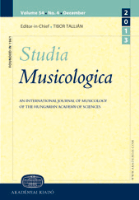
Studia Musicologica
Advancing Scholarly Discourse in Music StudiesStudia Musicologica, published by AKADEMIAI KIADO ZRT, stands as a leading journal in the field of musicology, dedicated to the exploration and analysis of music across diverse cultures and historical contexts. With its ISSN 1788-6244 and E-ISSN 1789-2422, this journal provides an essential platform for disseminating high-quality research and critical analyses, thereby contributing significantly to scholarly discourse in music studies. Although it operates on a traditional access model, its rigor and foundational contributions ensure that it remains invaluable for researchers, professionals, and students alike. Situated in the heart of Hungary, Studia Musicologica engages with a broad spectrum of topics including music theory, ethnomusicology, and music history, fostering a deeper understanding of music's multifaceted role in society. This makes it an essential resource for anyone interested in advancing their research or professional practice within the expansive field of musicology.

Problemy Muzykalnoi Nauki-Music Scholarship
Connecting Scholars Through the Art of MusicWelcome to Problemy Muzykalnoi Nauki-Music Scholarship, a leading journal in the field of music scholarship published by the esteemed Gnesin Russian Academy of Music. With an ISSN of 2782-358X and an E-ISSN of 2782-3598, this Open Access journal has been committed to the dissemination of high-quality research since 2009, making scholarly work accessible to a global audience. Covering diverse aspects of music theory, history, and its socio-cultural impacts, Problemy Muzykalnoi Nauki serves as an essential platform for scholars, educators, and practitioners in the arts and humanities, as well as in social sciences related to music education. While its Scopus coverage was discontinued in 2021, the journal remains influential, holding a rank of #48 in the Arts and Humanities category and a percentile of 67th, showcasing its relevance and rigor in the discipline. We invite researchers and students alike to explore the rich contributions made within these pages, fostering a deeper understanding and appreciation of music in contemporary society.
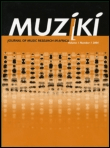
Muziki-Journal of Music Research in Africa
Fostering Dialogue Through Diverse Musical NarrativesMuziki - Journal of Music Research in Africa is a leading publication dedicated to exploring the rich tapestry of music research across the African continent. Published by Routledge Journals, Taylor & Francis Ltd, this journal has been at the forefront of scholarly discourse since its inception in 2004, providing a platform for innovative and interdisciplinary approaches to the study of music. With an ISSN of 1812-5980 and E-ISSN of 1753-593X, it ensures wide accessibility to both print and digital audiences. As of 2023, it holds a prestigious Q3 ranking in the field of Music, reflecting its commitment to quality scholarship and the promotion of diverse musical narratives. Muziki is particularly invaluable for researchers, professionals, and students seeking to deepen their understanding of African musicology and its socio-cultural relevance. The journal publishes original research articles, reviews, and critical essays, highlighting contemporary developments and historical contexts in music research. With a Scopus rank of 59/180 in the Arts and Humanities Music category, it stands as a respected source for advancing knowledge and fostering dialogue within the global music community.

Musicology Today
Bridging History, Theory, and EthnomusicologyMusicology Today, published by SCIENDO, is a pivotal journal in the field of musicology, presenting a platform for scholars, researchers, and practitioners to disseminate their findings and engage with current trends in music research. With its ISSN 1734-1663 and E-ISSN 2353-5733, the journal aims to provide a comprehensive overview of various aspects of music, including theory, history, and ethnomusicology, fostering a multidisciplinary dialogue among its contributors. Located in Warsaw, Mazovia, Poland, this journal is not only committed to high academic standards but also to promoting open access to knowledge, thereby enhancing accessibility for a global audience. As it continues to bolster its reputation in the academic community, Musicology Today plays an essential role in shaping the future of music scholarship and invites the engagement of seasoned researchers and emerging voices alike.